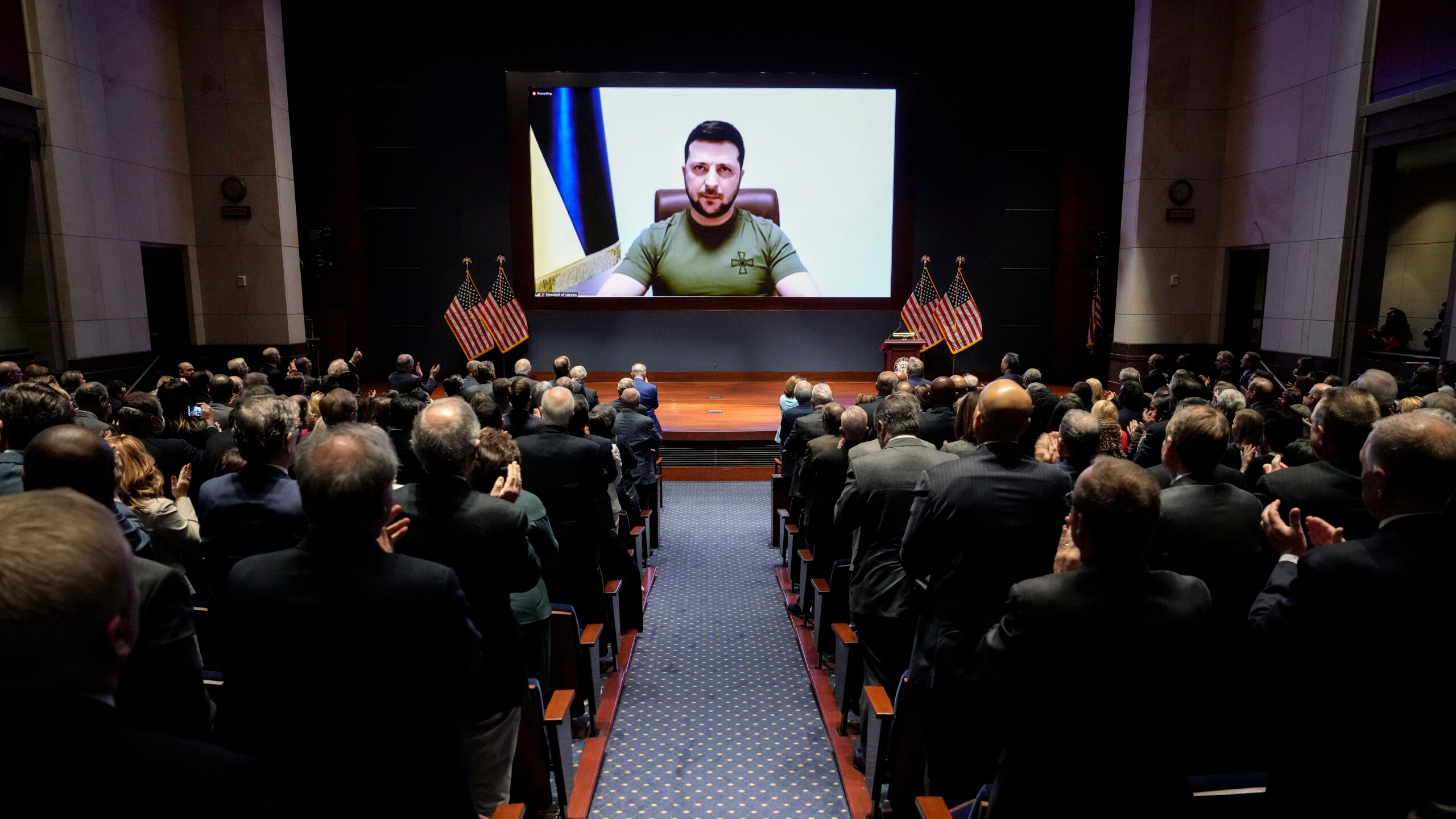Calls to ‘secure the skies’ continue as Zelenskyy appeals to Congress for more aid
“It’s a beautiful country, it’s being annihilated right now,” said Stephen Vitvitsky, talking about his family’s ancestral homeland. “There’s daily terror across all of Ukraine, including western Ukraine.”
For this south Minneapolis resident, the Russian invasion — and the onset of war, is deeply personal.
[anvplayer video=”5096424″ station=”998122″]
Vitvitsky has family in the western Ukraine city of Chernivtsi, and he says they are trying to help.
“They are sheltering folks from central and eastern Ukraine,” he said. “They are preparing humanitarian aid and making this stuff that comes over the border from Romania, from Slovakia, from Hungary and getting it into parts of Ukraine that are more immediately affected.”
Vitvitsky’s remarks come after a historic event.
Wednesday morning, Ukrainian President Volodymyr Zelenskyy, speaking remotely from Kyiv, appealed to Congress for more military aid and a no-fly zone to prevent Russian air attacks.

Ukrainian President Volodymyr Zelenskyy delivers a virtual address to Congress by video at the Capitol in Washington, Wednesday, March 16, 2022. (Drew Angerer, Pool via AP)
“Russia has turned the Ukrainian sky into a source of death,” he told the assembled lawmakers. “Russian troops have already fired 1,000 missiles at Ukraine, countless bombs. Is this a lot to ask for, to create a no-fly zone over Ukraine to save people?”
Outside his home, decorated with the blue and yellow colors of the Ukrainian flag, Vitvitsky talked about Zelenskyy’s speech and his concerns about what may lay ahead.
“I thought he did a really good job. I thought his words were moving,” he says. “I think everyone’s gotten hung up on a no-fly zone, and that’s what the Ukrainians have been calling for. But really, the fundamental need is to secure the skies over Ukraine, and there are lots of different ways to do that.”
President Joe Biden called Zelenskyy’s speech “convincing and significant” and said he listened to him from the White House private residence.
“He speaks for people who have shown remarkable courage and strength in the face of brutal aggression — courage and strength that’s inspired not only Ukrainians, but the entire world,” the president added. “Putin is inflicting appalling, appalling devastation and harm on Ukraine, bombing apartment buildings, maternity wards, hospitals. I mean, it’s — it’s God awful.”
Biden also called Russian President Vladimir Putin a “war criminal.”
RELATED: Biden sending more anti-aircraft systems, drones to Ukraine
But in recent days, the president has referred to the creation of a no-fly zone over Ukraine as “World War III.”
The Pentagon has also refused requests to send fighter jets there.
While a no-fly zone is not part of the help laid out Wednesday, other aid is on the way.
Biden released details for $800 million in military support to Ukraine, including anti-aircraft systems and armed drones.
“We are going to give Ukraine the arms to fight and defend themselves through all the difficult days ahead,” the president stated.
For Vitvitsky, it’s a matter of who controls Ukrainian airspace.
“The Ukrainians are fighting vigorously but the air superiority that the Russians have is something that needs to be addressed and that is what is killing a lot of civilians in Ukraine,” he said.
We first met Vitvitsky in February, at a solidarity rally outside St. Constantine’s Ukrainian Catholic Church in northeast Minneapolis.
It was the day after the Russian invasion of Ukraine began.
RELATED: ‘They’re not alone’: Minnesotans with loved ones in Ukraine rally to denounce invasion
“People are terrified, and rightly so. They’re being invaded,” Vitvitsky said at the time. “Russian bombs are raining down all around Ukraine from the east to the west.”
Now, he says, weapons like stinger missiles aren’t enough to stop the growing number of Russian attacks.
“Those weapons provide support up to a certain point, but they’re not going to take down high-altitude warplanes, they’re not going to be able to intercept Russian missiles and rockets that are being fired from across the border,” Vitvitsky notes.
He hopes larger weapons will be part of the aid plan.
“Things like the MiGs from Poland that Ukraine has been asking for and have been hung up,” Vitvitsky says. “Things like advanced anti-missile systems to help Ukrainians defend themselves.”
For now, many of his thoughts are about family members, along with others in harm’s way.
“We speak via Zoom once a week, and then we exchange texts over WhatsApp,” Vitvitsky said. “Every time I ask them, ‘What is your number one priority? Still to secure Ukrainian skies?’ They say, ‘Absolutely. It’s our first, second and third priority.’
“We want the barbarism to stop, we want the carnage to stop, and it continues on a daily basis for Ukrainians.”